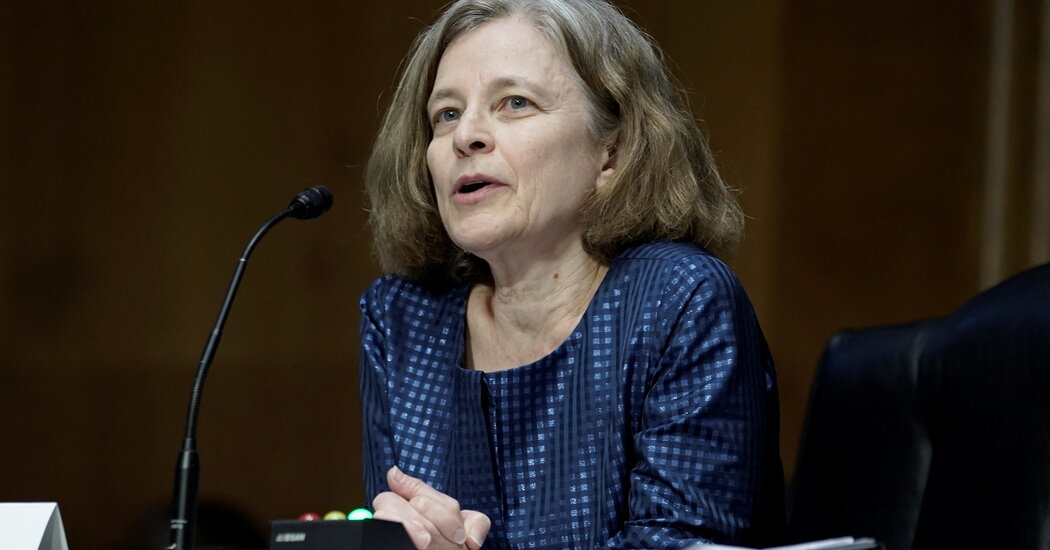
Sarah Bloom Raskin, President Biden’s nominee to serve as the Federal Reserve’s top bank regulator, withdrew from consideration after a Democratic senator said he would join Republicans in voting against her.
Ms. Raskin sent a letter to the White House on Tuesday with her decision, according to two people familiar with the decision.
While that will leave the Biden administration without the regulatory voice it was hoping for at the Fed Board, which oversees the nation’s largest banks, Ms. Raskin’s choice to withdraw could pave the way toward confirmation for the White House’s other Fed nominees. Republicans had been stonewalling Ms. Raskin’s nomination, and in the process were holding up the White House’s four other Fed picks, including the renomination of Jerome H. Powell for Fed chair.
Ms. Raskin almost certainly lacked sufficient support to pass the Senate because Republicans opposed her nomination to be vice chair for bank supervision and Senator Joe Manchin III, a West Virginia Democrat, said on Monday that he would not vote to confirm her.
In deciding to withhold support for Ms. Raskin, Mr. Manchin essentially doomed her chances for confirmation. Republicans had shown little appetite for placing a supporter of tougher bank regulation into a powerful regulatory role at the Fed and had refused to even allow her nomination to come to a vote in the Senate Banking Committee.
With the Senate evenly divided and Vice President Kamala Harris able to break ties, Democrats needed all 50 lawmakers who caucus with their party to vote for Ms. Raskin for her nomination to advance. Republicans had boycotted her nomination over her work in the private sector, refusing to show up to a key vote to advance it, even as they criticized her position on climate regulation.
Republicans suggested that Ms. Raskin’s prior writings showed that she would take too aggressive of a tack when it came to policing climate risks within the financial system, overstepping the unelected central bank’s boundaries.
“President Biden was literally asking for senators to support a central banker who wanted to usurp the Senate’s policymaking power for herself,” Senator Mitch McConnell of Kentucky, the minority leader, said on Tuesday. He added: “It is past time the White House admit their mistake and send us someone suitable.”
Mr. Manchin, who represents a coal state and has close ties to the fossil fuel industry, cited Ms. Raskin’s past comments on the role that financial regulation should play in fighting climate change in explaining his opposition.
But Mr. Biden’s Fed nominee had faced concerns that extended beyond her climate views. Republicans on the banking committee boycotted a hearing that would have allowed Senate Democrats to advance Ms. Raskin and the other Fed nominations over work she did in the private sector — and the way she answered questions about that work.
Republicans had specifically cited concerns about Ms. Raskin’s time on the board of directors of a financial technology firm. The company, Reserve Trust, secured a coveted account with the Fed — giving it access to services that it now prominently advertises — after Ms. Raskin reportedly called a central bank official to intervene on its behalf.
It is unclear how much Ms. Raskin’s involvement actually helped. But the episode has raised questions, because she previously worked at the Fed and because she made about $1.5 million from the stock she earned for her Reserve Trust work. Democrats regularly denounce the revolving door between regulators and financial firms.
Republicans had demanded that Ms. Raskin provide more answers about what happened while she was on the company’s board, but she had largely said she could not remember, drawing criticism from lawmakers. Senator Patrick J. Toomey of Pennsylvania, the top Republican on the committee, led his colleagues in refusing to show up to vote on Ms. Raskin and the other Fed nominees until she provided more answers.
Mr. Toomey signaled on Monday that he would favor allowing the other Fed nominees to proceed. Besides Mr. Powell, Mr. Biden has nominated Lael Brainard to be the Fed’s vice chair and two academic economists — Philip Jefferson and Lisa Cook — to be governors.
Emily Cochrane and Michael D. Shear contributed reporting.




